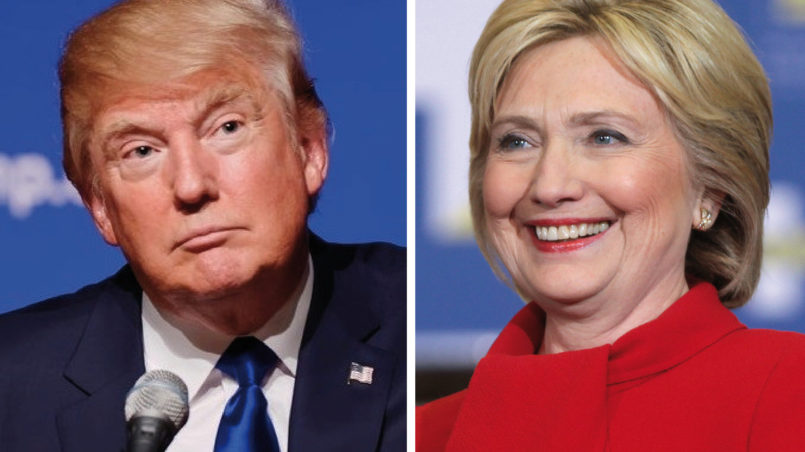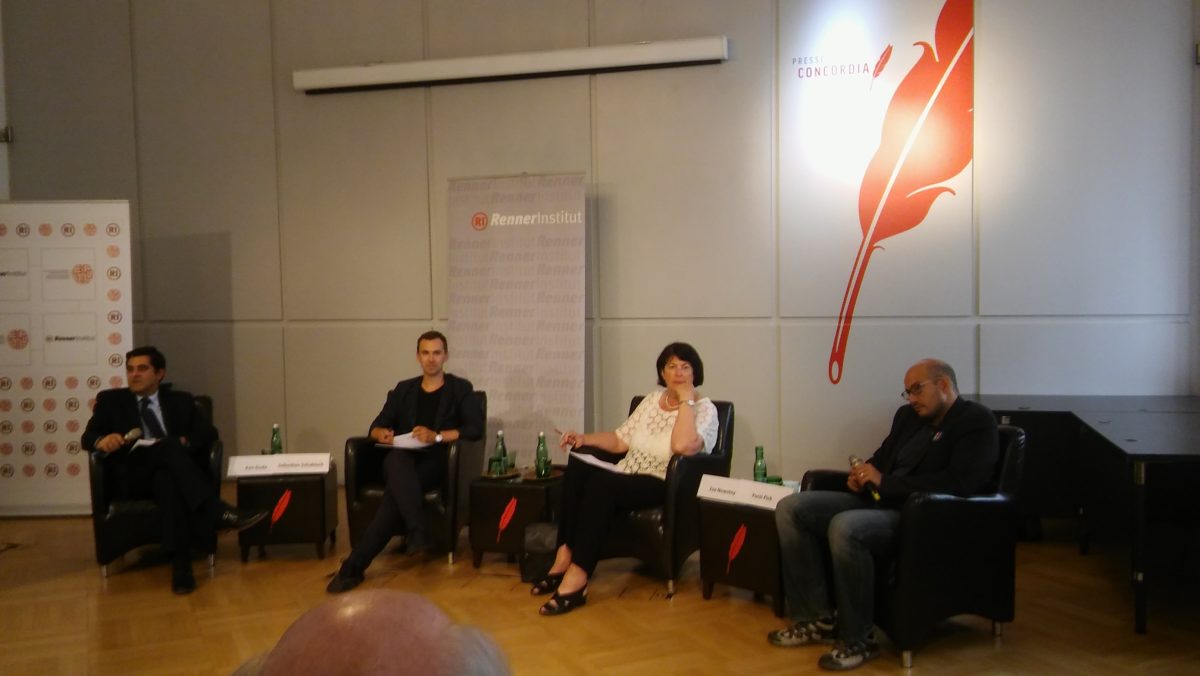US elections – expect the unexpected?

Event data
- Datum
- 4. 7. 2016
- Host
- Renner Institut
- Location
- Presseclub Concordia
- Event-type
- Panel discussion
A few months before the presidential elections in the United States, some experts met at the Concordia Press Club to explore likely outcomes, but also to question the American electoral system. It is interesting that in the USA, the same phenomena that we find in Europe, are emerging as well: voter dissatisfaction regarding their say, radicalization of the wording and the call for reform.
Ken Gude of the Center for American Progress, an organization affiliated with the Democrats, visited Vienna on his last stop through Europe. He thinks that the Democrats have left a devided impression in mid-May, which has now dissipated after the de facto abandonment of Bernie Sanders. In contrast, Donald Trump was already clearly going to be the winner of the Republican primary, the time since, however, has played out far from optimal for him: Both his controversial statements about the Florida attack ( “Congratulations, I called it”) as well as the fraud scandal surrounding the Trump University have affected his approval ratings negatively. Hillary Clinton is now comfortably in the lead, but the Democrats should not sink into complacency. No panic – no contemplation, should be the democratic slogan, says Gude: One should neither panic over developments within the own party nor because of interim survey highs of the rival candidate, nor should one feel too safe of having the victory in the bag.
According to Gude, the election on November 7th, constitutes the first one since World War II, in which a candidate rejects the status of the USA as world police. The criticism of the high cost of NATO, primarily carried by the US, although the organization also guarantees the security of Europeans, is repeatedly coming through with Trump. On the other hand we hear often hear pithy sayings about the fight against the Islamic State from him, which can probably be won only with allies throughout the world. But on the whole, he seems to pursue more of an isolationist policy – put America first. Hillary Clinton is expected to continue the strategy of Barack Obama on this issue.

A big problem for Democrats, according to Gude, is that they have lost the working class, much like the Social Democrats in Europe – and years prior, at that. The best example is West Virginia, which is home to twice as many registered Democrats as Republicans, but has been electing republican continuously since 2000. From this potential, Trump recruits the majority of his voters. The approval of the non-white population towards the Democratic Party is slowly declining, as well. The still-functioning coalition (non-whites, women, educated), which works well on presidential level, must be extended to other levels of government (Congress, states etc) where Republicans dominate.
With the Republicans – in addition to the demographic trends (the number of causasians is decreasing) – Gude locates the problem that they have lost peoples’ confidence by repeatedly making announcements that could not possibly be implemented, eg repeal Obamacare.
As we have known for a few days, the email affair will likely not lead to any lawsuits for Hillary Clinton – such, at any rate, is the recommendation of the FBI. The State Department still wants to investigate further, even if there will be no charge. Simultaneously, Trumps ‘America first’ policy has made many negative headlines with their similarities to America’s right-wing parties of the thirties. With yet another controversial statement, Trump has again made few friends: Just before the Brexit, he visited Scotland to open a golf course. As part of this, he replied to the question of how the Brexit would affect the British pound: “It will fall. Which is good, because then more people come to me to play golf. ”
The three main candidates of the election campaign so far, are driving strikingly different strategies, according to Yussi Pick: Bernie Sanders’ distributive campaigning aimed primarily at ordinary citizens and intellectuals and artists. Hillary Clinton’s approach is top-down, the election campaign is very well organized, everything is analyzed, local people do the legwork. Donald Trump is counting on broadcasting – television, Facebook and Twitter. His problem will be the funding, medium-term: While Hillary Clinton has received nearly 70 million in campaign funds in June alone, Donald Trump received a mere 1.5 million in May. Similarly, he lacks the local people who do the basic work and go from door to door.
To Eva Nowotny, the most important current threat to the political process is a tendency of the losers of global development to have lost confidence in politics and turn to the populists. The US withdrawal from the political scene, the committed fan of representative democracy regards with great unease, because an unpredictable vacuum would arise and democratic development would be at risk in other parts of the world. This transfiguring view could probably be argued about vividly, when analyzing how many wars and subsidies of dictators the United States – and of course Europe – have to answer for.
When a new president comes into office, an approximately twelve-month transition period usually starts. Up to 6,000 people are exchanged, and the incorporation takes correspondingly long. After that, the struggle for the Mid-Term Elections already begins. Since 1986, these were always lost by the presidential party selected or confirmed two years earlier, with one exception (1998), resulting in a stalemate between Congress and the President and thus a standstill in the political development. Therefore Several discussants also recognize great need for reform of the political system of the United States: The electoral system is disorganized. What is far more problematic, however, is the fact that some senators are not faced with any challengers in their constituency over a long period. The greatest danger was a rival candidate from their own party – the other party, in light of the hopelessness to win the election, often does not even offer any candidates – also for the reason, that election campaigns in the United States are extremely expensive. In the House, only ten percent of all seats are contested, the vast majority falling to the same party in every election.
The signs that the political system in the whole Western world is in a crisis, can also be seen in the United States: In this election campaign, the probably most disliked candidates ever are facing each other. Outstanding voting motive in surveys is to try to prevent the respective other candidate. Even the Congress, at a 13 percent approval rating, is on a historically low level of support. The situation that the President and Congress block each other for many years, is leading to great disaffection in the electorate. Likewise, the situation that in many elections you there is no real choice any more (see above). A commission to reform the American electorial system, came to nothing. Proposals are not lacking. However, as with weapons laws, the Americans’ love for their Constitution seems to be insurmountable. To change the Constitution, there are many hurdles: Two-thirds of Congress and 60 percent of governors would have to approve an application.
Sanders’ success can also be explained by the fact that the youth sees him as the legitimate successor to Obama. Sanders probably never had the realistic intention to become President from the beginning, according to Yussi Pick: His goal was, to give the progressive forces a voice. In this light, his experiments to recruit progressive people on the basis of the political pyramid must be viewed. This progressive direction had been present even before Sanders in the Democratic Party, but he has brought them to light. With the Establishment of the Democrats, Sanders who had only joined in April 2015 (as a senator he was a candidate without party) did not do well: only ten percent of superdelegates (who make up a significant part of the vote in the nomination of candidates) will vote for him. In the primaries he won 45 percent of the popular vote. The media more or less ignored Sanders at the beginning – Trump was the focus of the reporting. As the CBS boss put it, Trump “may not be good for America, but he is damn good for CBS”.
The many lies and half-truths that have hitherto dominated the election campaign, are subject of discussion, as well: 74 percent of the Trump’s statements checked by politifact, are said to be wrong. For Clinton, it is supposedly only 16 percent. The blizzard of lies has a dynamism, such that there is no time to check a statement before the next is already running on twitter, facebook or other channels. The call for realtime fact checking has already been followed by some media and websites. Trump has also done away with the political correctness – an aspect that appeals to many of his constituents. The alleged advantage, the Democrats enjoy in media reports, has been disproved by a recent study: 84 percent of the coverage about Clinton in the primaries was negative. Instead, the numerous performances and reports on Trump have affected his poll statistics in a positive way. That fact that reputable media have lost their appeal, and are only consumed by a minority any more, Eva Nowotny sees critical, especially in relation to the increasingly strong calls for direct democracy. To her, the Brexit shows direct democracy as the big loser, since both sides had worked with many lies and falsehoods, thus influencing people. The majority of people today gets their information on the Internet, with small TV stations or even in large propaganda channels like Fox, where fact checking is not part of the standard. Here it should be mentioned that some established media have damaged their reputation with partially biased reporting – an observation that is often overlooked, especially by representatives of the elite.
The closing question round brought forth two notable statements: Approximately eight million Americans of voting age live abroad, the majority of which traditionally elects democratic. In the battleground states, Hillary Clinton currently has the lead. Even previously Republican-controlled states such as North Carolina, Georgia, and Arizona with a shrinking white majority are likely to be contested this time. Bad news for Trump.
Translation from German: Serena Nebo


